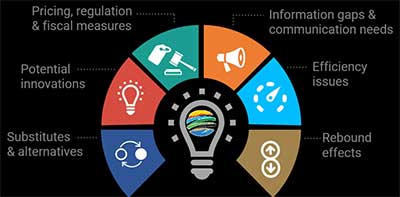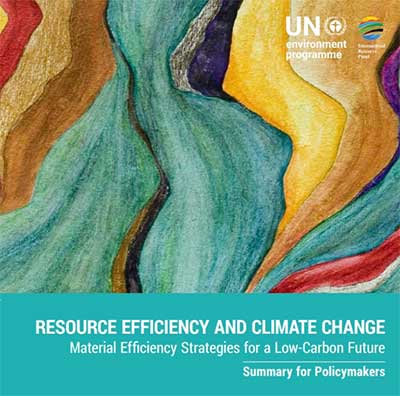International resource panel report on resource efficiency and climate change launched
The report titled "Resource Efficiency and Climate Change - Material Efficiency Strategies for a Low-Carbon Future" by international resource panel has been launched recently . This report conducts a rigorous assessment of the contribution of material efficiency to GHG abatement strategies. More concretely, it assesses the reduction potential of GHG emissions from material efficiency strategies applied in residential buildings and light duty vehicles, and reviews policies that address these strategies. It shows that increasing material efficiency is a key opportunity to achieve the aspirations of the Paris Agreement.
This report was developed by the IRP in response to a request by leaders of the Group of 7 nations in the context of efforts to promote resource efficiency as a core element of sustainable development. It conducts a rigorous assessment of the contribution of material efficiency to GHG abatement strategies. More concretely, it assesses the reduction potential of GHG emissions from material efficiency strategies applied in residential buildings and light duty vehicles, and reviews policies that address these strategies.

According to the Panel, GHG emissions from the material cycle of residential buildings in the G7 and China could be reduced by at least 80% in 2050 through more intensive use of homes, design with less materials, improved recycling of construction materials, and other strategies.
Significant reductions of GHG emissions could also be achieved in the production, use and disposal of cars. IRP modelling shows that GHG emissions from the material cycle of passenger cars in 2050 could be reduced by up to 70% in G7 countries and 60% in China and India through ride-sharing, car-sharing, and a shift towards trip-appropriate smaller cars, among others.
Emissions from the production of materials as a share of global green house gases increased from 15 percent in 1995 to 23 percent in 2015. It is also mention worthy here that material efficiency strategies can reduce emissions from materials and operational energy in housing by 40 percent in 2050 in G 7 countries and up to 70 percent in india and China . The buildings and construction sector is responsible for almost 40% of energy and process related CO2 emissions globally – its construction materials generate considerable waste and the buildings process and operation are a key energy consumer.
About International Resource Panel :
The International Resource Panel (IRP) was launched by the United Nations Environment Programme (UNEP) in 2007 to build and share the knowledge needed to improve our use of resources worldwide.
The Panel consists of eminent scientists with expertise in resource management issues. It studies key questions around global resource use and produces assessment reports that distil the latest scientific, technical and socio-economic findings to inform decision-making.

The Panel provides advice and connections between policymakers, industry and the community on ways to improve global and local resource management. It includes scientists, governments from both developed and developing regions, civil society, industrial and international organizations.
The Panel's goal is to steer us away from overconsumption, waste and ecological harm to a more prosperous and sustainable future.
The International Resource Panel has more than 35 expert members drawn from a wide range of academic institutions and scientific disciplines, supported by a small Secretariat hosted by UNEP.
The IRP investigates the world’s most critical resource issues with a view to developing practical solutions for governments, industry, and society.
The objectives of the Panel are to provide independent, coherent, authoritative, and policy-relevant scientific assessments on the sustainable use of natural resources and, in particular, their environmental impacts over the full life cycle; and contribute to a better understanding of how to decouple economic growth from environmental degradation.







